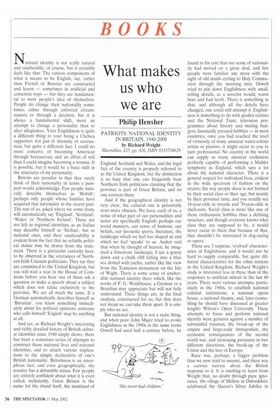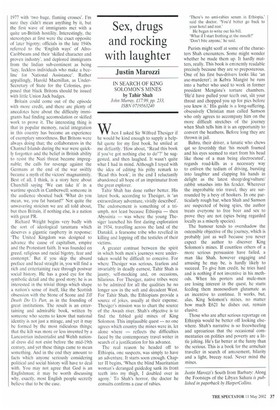What makes us who we are
Philip Hensher
PATRIOTS: NATIONAL IDENTITY IN BRITAIN, 1940-2000 by Richard Weight Macmillan, £25, pp. 826, ISBN 0333734629 National identity is not really natural and unalterable, of course, but it certainly feels like that. The various components of what it means to be English, say, rather than French or Russian are constructed and learnt — sometimes in artificial and conscious ways — but they are fundamental to most people's idea of themselves. People do change their nationality sometimes, either through enforced circumstances or through a decision, but it is always a fundamental shift, more an attempt to change a personality than to alter allegiances. Your Englishness is quite a different thing to your being a Chelsea supporter; not just in intensity or seriousness, but quite a different fact. I could no more conceive of becoming American through bureaucracy and an effort of will than I could imagine becoming a woman. It is possible, but it would be a basic shift in the structures of my personality.
Britons are peculiar in that they rarely think of their nationality in terms a passport would acknowledge. Few people naturally describe themselves as 'British'; perhaps only people whose families have acquired that nationality in the recent past. The rest of us, asked where we come from, will automatically say 'England', 'Scotland', 'Wales' or 'Northern Ireland'. These are not felt as regional identities, as an Italian may describe himself as 'Sicilian', but as national ones, and their unalterability is evident from the fact that no reliable political stance may be drawn from the statement. There is a particular curiosity here, to be observed in the utterances of Northern Irish Unionist politicians. They say they are committed to the United Kingdom, but you will wait a year in the House of Commons before you hear one of them ask a question or make a speech about a subject which does not relate exclusively to the province. We are all much the same. If a German automatically describes himself as 'Bavarian', you know something immediately about his political opinions; someone who calls himself 'English' may be anything at all.
And yet, as Richard Weight's interesting and richly detailed history of British cultural identities since 1940 amply shows, there has been a conscious series of attempts to construct those national lives and national identities, and to attach various implications to the simple declaration of one's British nationality. Britishness is an amorphous fact, and even geographically, the country has a debatable status. Few people are entirely confident about what it is even called; technically, Great Britain is the name for the island itself, the mainland of
England, Scotland and Wales, and the legal fact of the country is properly referred to as the United Kingdom, but the distinction is so hazy that one can frequently hear Northern Irish politicians claiming that the province is part of Great Britain, and no one corrects them.
And if the geographical identity is not very clear, the cultural one is potentially even more obscure. We have, each of us, a sense of what part of our personalities and tastes are specifically English; perhaps our social manners, our sense of humour, our beliefs, our favourite sports, literature, the landscape which we feel has shaped us and which we feel 'speaks' to us. Auden said that when he thought of heaven, he imagined a limestone landscape; I see a grassy down and a chalk cliff falling into a blue sea dotted with yachts, rather like the view from the Tennyson monument on the Isle of Wight. There is some sense of unalterable national identity there which, like the works of P. G. Wodehouse, a German or a Brazilian may appreciate but will not fully understand. These things are, in the final analysis, constructed for us; but that does not mean we can take them apart. It is simply who we are.
But national identity is not a static thing, and when poor John Major tried to evoke Englishness in the 1990s in the same terms Orwell had used half a century before, he
found to his cost that our sense of nationality had moved on a great deal, and few people were familiar any more with the sight of old maids cycling to Holy Communion through the morning mist. Orwell tried to pin down Englishness with small, telling details, as a novelist would; warm beer and bad teeth. There is something in that, and although all the details have changed, one could still attempt it. Englishness is something to do with garden centres and the National Trust, television programmes about history and mating badgers, fanatically pursued hobbies — in most countries, once you had reached the level of virtuosity of many amateur water-colour artists or pianists, it might occur to you to turn professional. No country in the world can supply so many amateur orchestras perfectly capable of performing a Mahler symphony as England, which says a lot about the national character. There is a general respect for individual lives, evident in the wide spectrum of fashion on the streets; the way people dress is not formed by their social class or their age, but mainly by their personal taste, and you readily see 16-year-olds in tweeds and 70-year-olds in shell-suits. Social class is more like one of those enthusiastic hobbies than a defining structure, and though everyone knows what class they are supposed to be, it would never occur to them that because of that, they shouldn't be interested in dog-racing or opera.
These are, I suppose, 'evolved' characteristics of Englishness, and it would not be hard to supply comparable, but quite different characteristics for the other nations in the United Kingdom. Richard Weight's study is interested less in these than in the responses to artificial stimuli in the last 60 years. There were various attempts, particularly in the 1940s, to establish national cultural institutions; a national opera house, a national theatre, and, later (something he should have discussed at greater length) Wilson's Open University. These attempts to focus and perform national identity were gestures against a number of substantial traumas; the break-up of the empire and large-scale immigration, the economic consequences of the second world war, and increasing pressures in two different directions, the break-up of the Union and the lure of Europe.
Race was, perhaps, a bigger problem than we now tend to assume, and there was a curious naivety about the British response to it. It is startling to learn from Weight that, no doubt through pure ignorance, the village of Shilton in Oxfordshire celebrated the Queen's Silver Jubilee in
1977 with 'two huge, flaming crosses'. I'm sure they didn't mean anything by it, but the first wave of immigrants met with a quite un-British hostility. Interestingly, the stereotypes at first were the exact opposite of later bigotry; officials in the late 1940s referred to the 'English ways' of AfroCaribbeans and their 'skilled character and proven industry', and deplored immigrants from the Indian sub-continent as being 'lazy, feckless individuals who make a beeline for National Assistance'. Rather appallingly, Harold Macmillan, as UnderSecretary of State for the Colonies, proposed that black Britons should be issued with little Union Jack badges.
Britain could come out of the episode with more credit, and there are plenty of anecdotes here about the difficulty immigrants had finding accomodation or skilled work to prove it. The interesting thing is that in popular memory, racial integration in this country has become an experience of exemplary smoothness. But Britons were always doing that; the collaborators in the Channel Islands during the war were quickly forgotten and the belief in British ability to resist the Nazi threat became impregnable; the calls for revenge against the Germans at the end of the war swiftly became a myth of the victors' magnanimity. Best of all. I think, is a story here about Churchill saying We can take it' in a wartime speech in Camberwell; someone in the audience shouted back 'What do you mean, we, you fat bastard?' Not quite the unwavering stoicism we are all told about, but then Britain, if nothing else, is a nation with great PR.
Richard Weight begins very badly with the sort of ideological tarantara which deserves a gigantic raspberry in response: 'The United Kingdom was designed to advance the cause of capitalism, empire and the Protestant faith. It was founded on greed, religious and racial bigotry, fear and contempt.' But if you skip the absurd preface and head straight in, you will find a rich and entertaining race through postwar social history. He has a good eye for the symbolic detail and the good story; he is as interested in the trivial things which shape a nation's sense of itself, like the Scottish obsession with the Stone of Scone and Till Death Do Us Part, as in the founding of great institutions. The result is an entertaining and admirable book, written by someone who seems to know that national identity is not just a mirage, and yet it may be formed by the most ridiculous things; that the kilt was more or less invented by a Lancastrian industrialist and Welsh national dress did not exist before the mid-19th century, and yet these things came to mean something. And in the end they amount to facts which anyone seriously considering political and social history will have to deal with. You may not agree that God is an Englishman; it may be worth discussing why, exactly, most English people secretly believe that to be the case.







































































 Previous page
Previous page